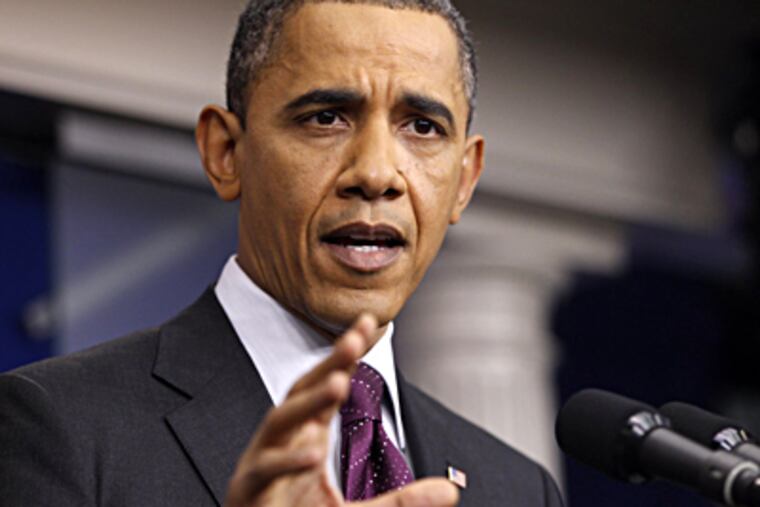The American Debate: Obama's national security cred
There was a time when Republicans would tag the Democrats as national security wimps, and Democrats would quake in their boots. But those days are over, as evidenced by President Obama's Tuesday news conference.

There was a time when Republicans would tag the Democrats as national security wimps, and Democrats would quake in their boots. But those days are over, as evidenced by President Obama's Tuesday news conference.
When he was asked to comment on the latest rhetoric from the campaign trail - where Mitt Romney, Rick Santorum, and Newt Gingrich call him weak on Iran; where Romney says Iran will obtain "the bomb" if Obama wins in November - the president laid out the case for heightened diplomatic pressure. Then he segued into an extended smackdown of his rivals, worth quoting in full:
"What's said on the campaign trail - those folks don't have a lot of responsibilities. They're not commander-in-chief. And when I see the casualness with which some of these folks talk about war, I'm reminded of the costs involved in war. I'm reminded that the decision that I have to make in terms of sending our young men and women into battle, and the impacts that has on their lives, the impact it has on our national security, the impact it has on our economy.
"This is not a game. There's nothing casual about it. And when I see some of these folks who have a lot of bluster and a lot of big talk, but when you actually ask them specifically what they would do, it turns out they repeat the things that we've been doing over the last three years, it indicates to me that that's more about politics than actually trying to solve a difficult problem.
"Now, the one thing that we have not done is we haven't launched a war. If some of these folks think that it's time to launch a war, they should say so. And they should explain to the American people exactly why they would do that and what the consequences would be. Everything else is just talk."
A few minutes later, he resumed: "I do think that anytime we consider military action that the American people understand there's going to be a price to pay. . . . Sometimes we bear that cost. But we think it through. We don't play politics with it. When we have in the past - when we haven't thought it through and it gets wrapped up in politics - we make mistakes. And typically, it's not the folks who are popping off who pay the price."
When we have in the past. ... That was a reference to Iraq, a reminder that a decade ago, Republican neoconservatives railed about weapons of mass destruction and hurled us into a bloody trillion-dollar war without having thought it through. A decade ago, most Democrats were so terrified of the wimp tag that they signed on. But Obama on Tuesday showed he wasn't cowed, that the warmongers no longer run the show.
Clearly, Obama believes he has made his bones on national security. The polls bear him out; he consistently scores higher on foreign policy than on the domestic front, a rare mix for a Democrat. Whacking the top tier of al-Qaeda has helped. Ratcheting up the unmanned drone attacks has, too. So has orchestrating an international effort to severely tighten economic sanctions on Iran.
Nevertheless, GOP adviser Karl Rove seems to think that Obama can be painted as "weak and untrustworthy" (if only to convince conservative Jewish voters in pivotal Florida, Pennsylvania, and Ohio that Obama is irresolute on Israel); Gingrich seems to think he can successfully liken Obama to Jimmy Carter; and Republicans in general seem to think they can update the 1988 image of Michael Dukakis looking like Snoopy in that tank photo-op.
The hitch is that you can't fight something with nothing. The GOP presidential aspirants have lost ground in the polls during the very months they have been sounding off about Iran. The more that front-runner Romney tries to morph into Gen. Patton, the worse he does.
An ABC News/Washington Post poll reports that when Americans were asked in February who was more trustworthy to handle terrorism and international affairs, they favored Obama over Romney by 20 percentage points. That sounds remarkable, until you remember that Romney is a former one-term governor with zilch international experience; that most of what Romney says he'd do in Iran (keeping all military options on the table, plus "crippling sanctions") is stuff Obama is already doing; that Romney and his trailmates make it sound as if bombing Iran would be a cinch with no need for a Plan B.
Obama said Tuesday that warmongering campaign rhetoric was ill-suited for the sensitive task at hand. He basically sought to reframe the political debate over national security. Whereas it used to be a Republican-dominated choice between strong (GOP) and weak (Democrats), Obama says the choice is between responsible (him) and irresponsible (them).
Romney - still the likely, albeit battered, nominee - arguably can't win in November unless he erases his national security deficit. That may not be easy, given his record. During his first bid in 2008, he warned that if Obama became president and was forced to confront al-Qaeda, Obama "would retreat and declare defeat."
Gee. How has that prediction worked out?
or follow on Twitter @dickpolman1.